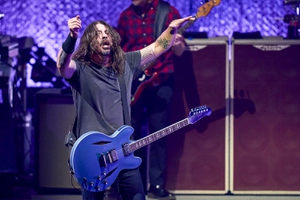On January 19, the day after Glenn Frey died from numerous ailments at 67, a line on the cover of the New York Daily News read, “Frey’s Death Is Sad, But I Still Loathe the Eagles.” The article inside declared, “Hating the Eagles defines whether a music fan is a fan of music or a bandwagon jumper.” It called the band’s music “pop pap … a warm glass of milk to get you to bed.” It cited Steely Dan lyrics and Big Lebowski scenes and albums by other ’70s artists (Bowie, Reed, Stones, Young) as proof that “The Eagles were, quite simply, the worst rock and roll band.” This tactless, boneheaded diatribe ran alongside a more formal tribute to Frey, who, again, had only been dead a few hours. I guess somebody thought they were being cool. Or “authentic.” Whatever.
How does a band inspire such odium, even in death? Blame the eternal East Coast vs. West Coast conflict. Back in ’73, Frey—who hated punk rock as much as he hated keeping his mouth shut—dissed the New York Dolls while playing a gig in New York City, which was like going to Boston and pooping in a Red Sox cap. East Coast rock critics preferred pale-faced underdogs and garage noise to sun-tanned jocks and peaceful, easy feelings. And the more popular the Eagles got, the more poisoned their screeds. Reviewing The Long Run for Rolling Stone in ’79, Dave Marsh wrote, “The fact that this pack of cliché-mongers is one of the biggest ‘rock’ bands today is perhaps the most pathetic commentary I know about the current state of the musical world.”
It didn’t help that the Eagles were never shy about having a formula. This band would never break its own mold. “Hotel California” sounded the same in the studio as it did onstage, nor did it change in the 14 years between Eagles Live and Hell Freezes Over. “With so many variables you can’t control, you should control everything you can,” Frey told Rolling Stone in a 1979 cover story. “We make it so the worst you can possibly be is great.” Honing and perfecting one’s craft might be admirable for a sushi chef, but it’s a very boring quality in a rock band.
Then there’s the “douche” factor. History of the Eagles, a documentary authorized by the band in 2013, made it abundantly, fascinatingly clear that this was the biggest group of a-holes that ever existed. The part when Frey bids a very flippant adieu to longtime bandmate Don Felder is the nastiest, most arrogant moment I’ve ever seen in a rock movie. And Don Henley’s misanthropic nature often makes me wince. Whenever I hear him sing, “We’re gonna find out, pretty mama, what turns on your lights” in “One of These Nights,” it always sounds like he’s this-close to committing a sex crime.
And yet, I always turn that song up when it comes on the radio. (One of my all-time favorite basslines.) The opening chords to “I Can’t Tell You Why” always make me smile. (I’m a sucker for Rhodes piano.) I can’t help singing “warm smell of colitas” whenever that damn song plays at the gym. (I prefer “warm smell of colitis.”) I used to fear that liking the Eagles meant I’d gotten old somehow. But what’s more pathetic than not liking the Eagles in some last-ditch effort to stay cool? Like a friend said last week, “If you don’t like the Eagles, you don’t love pop music.” Lighten up because you can. Resistance isn’t flattering.







